现代大学英语第一册课件Unit1
- 格式:pdf
- 大小:10.07 MB
- 文档页数:76
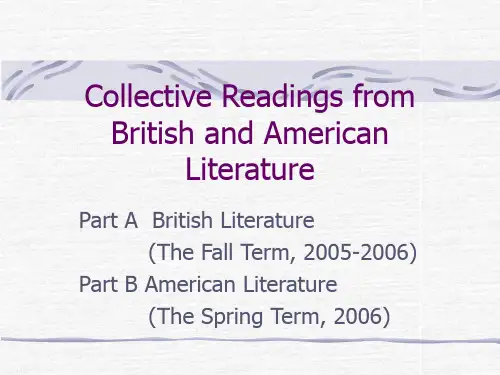
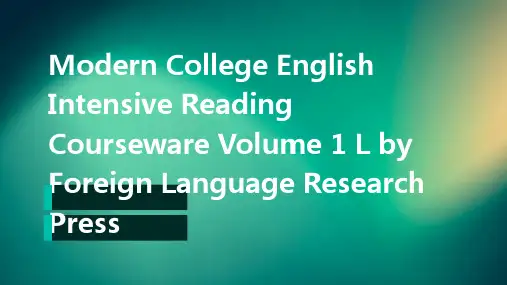
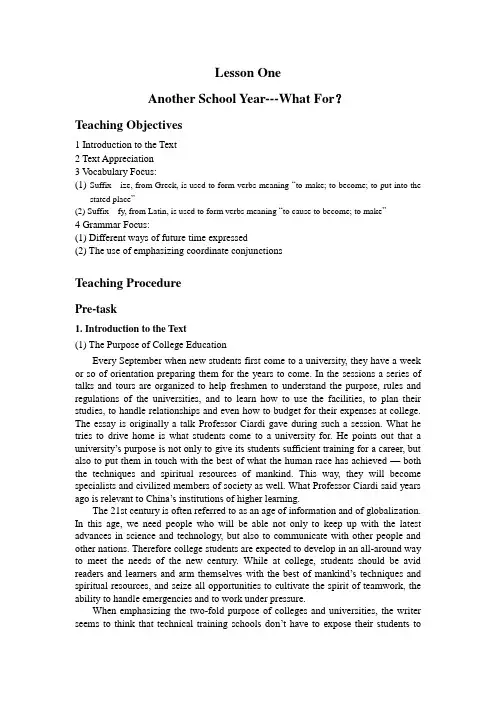
Lesson OneAnother School Year---What For?Teaching Objectives1 Introduction to the Text2 Text Appreciation3 V ocabulary Focus:(1) Suffix---ize, from Greek, is used to form verbs meaning “to make; to become; to put into thestated place”(2) Suffix---fy, from Latin, is used to form verbs meaning “to cause to become; to make”4 Grammar Focus:(1) Different ways of future time expressed(2) The use of emphasizing coordinate conjunctionsTeaching ProcedurePre-task1. Introduction to the Text(1) The Purpose of College EducationEvery September when new students first come to a university, they have a week or so of orientation preparing them for the years to come. In the sessions a series of talks and tours are organized to help freshmen to understand the purpose, rules and regulations of the universities, and to learn how to use the facilities, to plan their studies, to handle relationships and even how to budget for their expenses at college. The essay is originally a talk Professor Ciardi gave during such a session. What he tries to drive home is what students come to a university for. He points out that a university’s purpose is not only to give its students sufficient training for a career, but also to put them in touch with the best of what the human race has achieved — both the techniques and spiritual resources of mankind. This way, they will become specialists and civilized members of society as well. What Professor Ciardi said years ago is relevant to China’s institutions of higher learning.The 21st century is often referred to as an age of information and of globalization. In this age, we need people who will be able not only to keep up with the latest advances in science and technology, but also to communicate with other people and other nations. Therefore college students are expected to develop in an all-around way to meet the needs of the new century. While at college, students should be avid readers and learners and arm themselves with the best of mankind’s tech niques and spiritual resources, and seize all opportunities to cultivate the spirit of teamwork, the ability to handle emergencies and to work under pressure.When emphasizing the two-fold purpose of colleges and universities, the writer seems to think that technical training school s don’t have to expose their students toprofound ideas. We think that all schools, as well as colleges and universities, should aim at turning out useful and civilized members of society.(2) StyleAs it is originally a talk, the writer adopts a basically colloquial and familiar style. As you read, you feel as if the professor is talking to you face to face. To recreate the scene of his encounter with the tall boy in his office, he uses the direct speech. This way, the reader can imagine the ignorance and arrogance of the student. The sentence structure is generally not very complicated. But there are a few long and involved sentences in the second part of the text, for example, the last sentence in Paragraph 12. And the last paragraph consists of two very long ones.The tone in the first part is humorous and mildly sarcastic. The pharmacy major is referred to as “a beanpole with hair on top”, “this specimen” and “this particular pest”.2. Warm-up questions(1) Do you agree the point of view that universities are only for job training? Whatelse should a student strive for in a university?(2) How would you respond if your friend declares that he/she is only interested inlearning some job skill and therefore has no use for literature, philosophy, politics, history, art, music, etc.?Task- cycle1. ThemeThe author tries to clarify the purpose of a university: to put the students in touch with the best civilization that human race has created.2. StructurePart 1 (Paras.1- 8):The writer describes his encounter with one of his students.Part 2 (Paras.9-14):The author restates what he still believes to be the purpose of a university: putting its students in touch with the best civilizations the human race has created.3. Detailed study of the text (In this part, students are asked to take part in various activities.)(1) Let me tell you one of the earliest disasters in my career as a teacher.Let me tell you something that happened when I first became a teacher. It was one of the exasperating experiences in the first days of my teaching career.The word “disaster” often means “an unexpected event, such as a very bad accident, a flood or a fire that kills a lot of people or causes a lot or damage”. Here, used informally, it means “a complete failure”. The writer exaggerates the situation and uses the word humorously.(2) …I was fresh out of graduate school starting my first semester at theUniversity of Kansas City.…I was fresh out of graduate school starting my first semester at the University of Kansas City.be fresh out of/from sth. : to have just come from a particular place; to have just had a particular experience, e.g.Students fresh from collegeAthletes fresh from their success at the Ninth National Games(3) News as I was to the faculty, I could have told this specimen a number ofthings.Though I was a new teacher, I knew I could tell him what he could but did not say to the student.Note that the writer now referred to the student as a specimen in a humorous way, meaning he was typical of those students who came to a university just to get training for a career, as if he were typical of a certain species of animal.new to sth. : not yet familiar with sth. because you have only just started, arrived, etc.(4) I could have pointed out that he had enrolled, not in a drugstore-mechanicsschool, but in a college and that at the end of his course meant to reach for a scroll that read Bachelor of Science.I could have told him that he was now not getting training for a job in a technical school but doing a B.S. at a university.mean to do sth. : to intend to do sth.reach for sth. : to try to obtain sth.read Bachelor of Science: to have Bachelor of Science written on the certificate.(5) It would certify that he had specialized in pharmacy, but it would furthercertify that he had been exposed to some of the ideas making has generated within its history.The B.S. certificate would be official proof that the holder had special knowledge of pharmacy, but it would also be proof that he/she had been exposed to some profound ideas of the past.certify that … : to state officially, especially in writing that … , e.g.This is to certify that Ms. Li Lin worked at the IBM Beijing Office from January 1998 to June 2000.specialize in :to limit all or most of one’s study, business, etc. to a particular activity or subject, e.g.Professor Zhang specializes in American drama.My sister specializes in contract law.At age 30, he started a company specializing in home computers.generate: to produce or create sth. ,e.g.They have a large body of young people who are capable of generating new ideas. This machine can generate electricity in case of a power failure.(6) I could have told him all this, but it was fairly obvious he wasn’t going to bearound long enough for it to matter.I didn’t actually say all this to him, because I didn’t think he would stay at college very long, so it wouldn’t be important whether or not he knew what university education was for.be around: to be present in a place; to be availablematter (to sb.): to be important or have an important effect on sb. /sth. , e.g.It doesn’t matter whether or not you agree. My mind is made up.Does it matter if I write in pencil?(7) Nevertheless, I was young and I had a high sense of duty and I tried to put itthis way…Instead of telling him the importance of an all-round education, I tried to convince him from a very practical point of view.(8) You will see to it that the cyanide stays out of the aspirin, that the bull doesn’tjump the fence, or that your client doesn’t go to the electric chair as a result of your incompetence.You have to take responsibility for the work you do. If you’re a pharmacist, you should make sure that aspirin is not mixed with poisonous chemicals. As an engineer, you shouldn’t get things out of control. If you become a lawyer, you should make sure an innocent person is not sentenced to death because you lack adequate legal knowledge and skill to defend your client.be employed in doing sth. : (written) to spend your time doing sth. , e.g.The old man’s days were employed in reading, writing, and doing Chinese boxing. The old lady was busily employed in knitting sweaters for her grandchildren.see to it that: to make sure that, e.g.Can you see to it that all the invitations are delivered today?I’ll see to it that everything is ready before the guests arrive.average out to: (informal) to come to an average or ordinary level or standard, especially after being higher or lower, e.g.Meals at the university average out to about 10 yuan per day.The restaurant’s monthly profits averaged out at 30% last year.(9) Along with everything else, they will probably be what puts food on yourtable, supports your wife, and rears your children.In addition to all other things (such as satisfaction) these professions offer, they provide you with a living so that you can support a family-wife and children. (10) Will the children ever be exposed to a reasonably penetrating idea at home? Will your children ever hear you talk about something profound at home?be exposed to (usually, a new idea or feeling): to be given experience of it, or introduced to it, e.g.To learn more about the world we live in, we should be expose to different cultures.Studying abroad, he was exposed to a new way of life.(11) Will you be presiding over a family that maintains some contact with the great democratic intellect?Will you be head of a family who brings up kids in a democratic spirit?preside over: to be in charge or to control a meeting or an event, here used humorouslymaintain contact with: to keep in touch with, here used figuratively(12) Will there be a book in the house?Will you be reading serious books (not just popular fiction)?(13) Will there be a painting a reasonably sensitive man can look at withoutshuddering?What kind of pictures will you put up in your house? Will you have a painting in your house that shows some taste?(14)Me, I’m out to make money.Be out do sth. /for sth. : to be trying to get or do sth. , e.g.The company is out to break in to the European market.Look out for such end-of-the-year sales. These shops are out to trick you into buying what you don’t need.(15) “I hope you make a lot of it,” I told him, “because you’re going to be badlystuck for something to do when you’re not signing checks.”Note the sarcastic tone of the writer. In spite of what he had said, the student didn’t seem to be convinced. What the writer means here is something like this: If you don’t have any goal in life apart from making money to satisfy your desire for material riches, go ahead and make a lot of it.be stuck for sth : not to know what to do in a particular situation, e.g.In the middle of the speech, he was stuck for words (= he didn’t know how to go on).(16) If you have no time for Shakespeare, for a basic look at philosophy, for thecontinuity of the fine arts, for that lesson of man’s development we call history-then you have no business being in college.If you don’t want to improve your mind and broaden your horizon by studying a little literature, philosophy and the fine arts and history, you shouldn’t be studying here at college.have no business doing sth. /have no business to do sth. : to have no right to do sth. , shouldn’t have been/be doing sth. , e.g.You’ve no business telling me what to do.He has no business criticizing her about her make-up.(17) You are on your way to being that new species of mechanized savage, thepush-button Neanderthal.You will soon become an uneducated, ignorant person who can only work machines and operate mechanical equipment (one who doesn’t know anything about literature, music, the fine arts, culture in general, etc.).on the/one’s way to: on the point of experiencing or achieving, e.g.She is on the way to becoming a full professor.That bright young man is on his way to being the sales manager of the company. Nancy is well on her way to a nervous breakdown.new species of mechanized savage:new type of humans who are intellectually simple and not developed and who can only work machinesthe push-button Neanderthal:an uneducated, ignorant person who can only use/operate machines by pushing the buttons.(18) Our colleges inevitably graduate a number of such life forms, but it cannotbe said that they went to college; rather the college went through them-without making contact.A number of such push-button savages get college degrees. We cannot help that. But even with their degrees, we can’t say that these people have received a proper college education. It is more accurate to say that they go through college without learning anything.life forms: used sarcastically, meaning these people are living creatures, but can’t think or reasongo through (a person) (like a dose of salts):(of food, etc.) to be quickly excreted/to pass through the body as waste matter without being digested; here, used figuratively and sarcastically(19) Not one gets to be a human being unaided.No one can grow up to be a civilized person without the help of others.get to be/to do sth.: to reach the point at which you are, feel, know, etc. sth. , e.g. Once you get to know her better, you’ll realize she is a compassionate person.His absent-mindedness is getting to be a big problem.(20) There is not time enough in a single lifetime to invent for oneself everythingone needs to know in order to be a civilized human.To become a civilized person, you need to acquire the knowledge and develop the culture a civilized society needs. One lifetime is too short to create an environment for you to become civilized.a single lifetime: the time during which a person is alivea civilized human: a person who is pleasant, charming and without roughness of manner(21) You pass the great stone halls of, say, M.I.T., and there cut into the stone arethe names of the scientists.If you pass the great stone hall of a university, M.I.T. (Massachusetts Institute of Technology) for example, you’ll see the names of the scientists cut into the stone.(22) The chances are that few, if any, of you will leave your names to be cut intothose stones. Yet any of you who managed to stay awake through part of a high school course in physics, knows more about physics that did many of those great scholars of the past.Only very few, if any at all, of you will turn out to be great scientists and have your names cut into those stones. But if you were attentive enough in your high school physics class, any of you knows more about physics that many of those scientists whose names are cut into the stones.(the) chances are: it is likely(23) You know more because they left you what they knew, because you can startfrom what the past learned for you.You know more about physics not because you’re more talented that those scholars of the past, but because they left their knowledge to you, and because everything you first learn is what people learnt in the past. In other words, all human knowledge has been accumulated by people living in the past and has been passed on to us. You learn all this before you do any original research, or any research of your own.(24) And as this is true of the techniques of mankind, so it is true of mankind’sspiritual resources.This is the way we learn and develop the techniques of mankind. This is also how we inherit and advance mankind’s spiritual resources.Be true of (a person or a situation) : to apply to, e.g.It’s a wonderful opera. The music is superb. The same is true of the acting.The young tend to look ahead while the old like to look back upon the past. This is true in all nations(25) When you have read a book, you have added to your human experience. When you have read a book, you have enriched your life.(26) Read Homer and your mind includes a piece of Homer’s mind.When you read Homer’s works, you are sure to grasp some of his insights.(27) Through books you can acquire at least fragments of the mind and experience of Virgil, Dante, Shakespeare-the list is endless.Through reading their books, you can at least grasp a bit of the thinking and experience of such literary giants as Virgil, Dante, Shakespeare-there have been so many great thinkers and writers that it’s impossible to list them all here.(28) For a great books is necessarily a gift; it offers you a life you have not thetime to live yourself, and it takes you into a world you have not the time to travel in literal time.Because a great book is something given to us to enrich our lives. It presents to you a kind of life you don’t have a chance to experience yourself, and it describes for you places you don’t have time actually to visit.In literal time: in reality(29) A civilized mind is, in essence, one that contains many such lives and many such worlds.Basically, a cultured and educated person should know about such great variety of lives and worlds.In essence: basically, by nature, e.g.Hs is in essence an outgoing person.In essence they were asking for the impossible.(29) The faculty, by its very existence, say implicitly: “We have been aided bymany people, and by many books, in our attempt to make ourselves some sort of storehouse of human experience.”The existence of the faculty of the liberal arts college itself says in an implied way: “In our effort to make our faculty a place where our students can experience a variety of life they don’t have time to live themselves, we get a lot of help from many people and books, present and past…”(30) “We are here to make available to you, as best we can, that expertise.”“Our role/job/task is to do our best provide such knowledge for you (to become both specialists and civilized humans).”(be) here to do sth. : used to show your role in a situation, e.g.We’re all here to help you.Post-task1. Discussion(1) As a college student, what do you think of the question put forward by the author?Give your own answer to the question, and compare it with th e author’s.(2) After finishing reading the whole text, how do you evaluate the author’s answer? 2. Written work:Suppose you are the writer: write in about 130 words what you said to the tall student about the purpose of a university.Your retelling should contain three parts.1. How you came to talk about it2. What you said3. What you pointed out in conclusion。
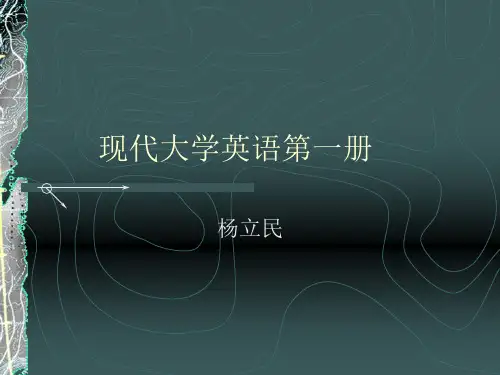
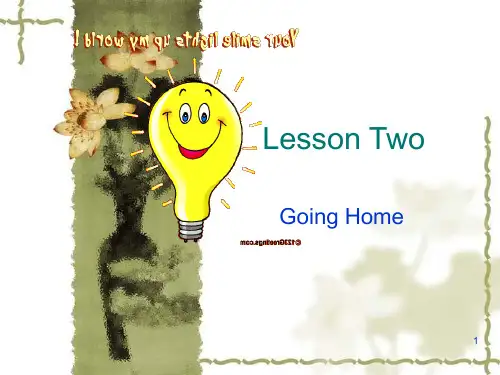
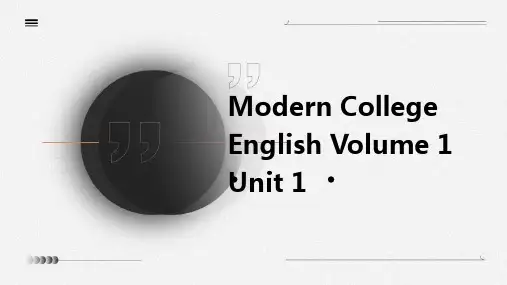
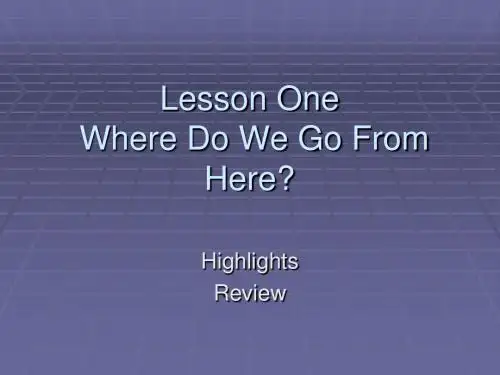
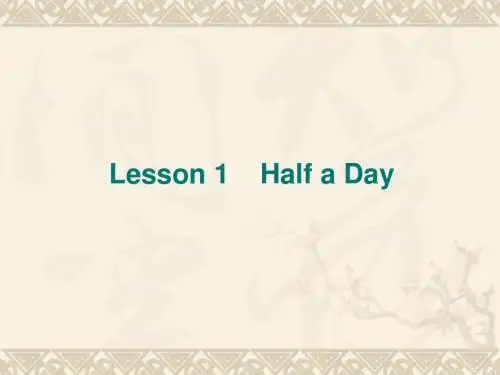
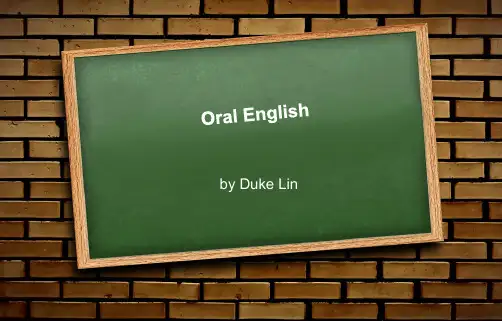
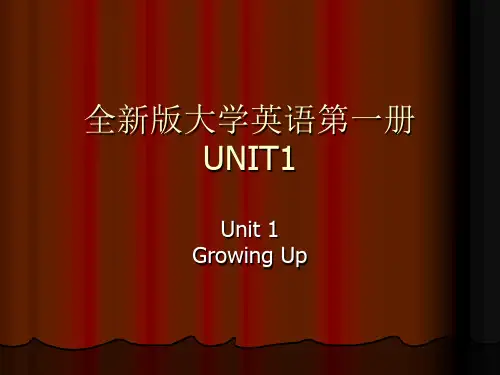
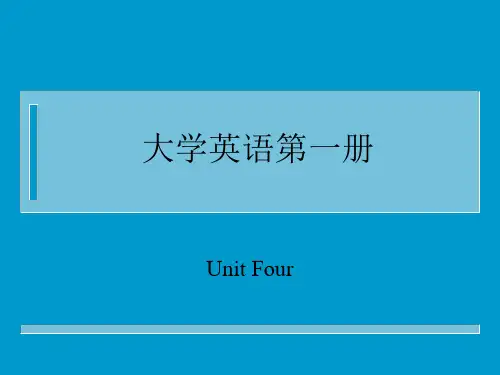
现代大学英语1unit1halfadayHalf a DayNaguib Mahfouz (1911-2006)一、Author1.IntroductionBorn in 1911, educated at Cairo University/// Wrote short stories and historical novels before WWII/// Turned to write novels of social realism after WWII/// Later works combined realism & symbolismA prolific writer: no fewer than 30 novels, more than 100 short stories, and more than 200 articles2.His worksThe Cairo Trilogy: Palace Walk, Palace of Desire, Sugar Street (first published 1957)The Time and Place and Other Stories, 19913.Influence◆The first Arab Writer to win the Nobel Prize in Literature –1988, The Cairo Trilogy◆Depicts realistically the social and political life in Egypt◆His classical and lucid style rejuvenated literary Arabic without recourse tocolloquialisms二.About the passage1. Para. 1-7The boy’s reluctance to go to school, His misgivings about school2. Para. 8-16The Boy’s life at school: Rich and colorful. Requiring discipline and hard work3. Para. 17-20At the end of school day: Everything has changed!A Short StoryPlot: a little boy’s first time to go to schoolSetting: on the way to school // at school // on the way home Protagonist/Narrator: “I” –the boy in the storyTheme of the story: what do you think?三.Language points1. clutch( h old tightly, usu. in fear, anxiety, or pain)clutch (to/onto)sb./sth. // be in sb’s clutch // fall/get into the clutch of sb.Silent and pale, the girl clutched (to/onto) her mother’s chest.A drowning man will clutch at a strawClutching the money in his hand, he hurried to the bank.2.in the year/by the time/the moment作先行词时省wheneg. I was born in the year china began its open and reform policy.By the time the ambulance arrived, it was too late.The moment I saw him, I recognized he was the criminal wanted by the police.3.throw sb. Into /out of sp.force to go to The burglar was thrown into prison.cause to be in a state of The news of an international war threw the whole nation into panic.Be devoted to doing. After a break, the students threw t hemselves into their studies. Phases:throw oneself at 猛然扑向throw back 拒绝,丢回来throw oneself on 依靠,听命于throw off 脱去,扔掉throw away 扔掉,抛弃4.make … out of cause to become把某人变成。